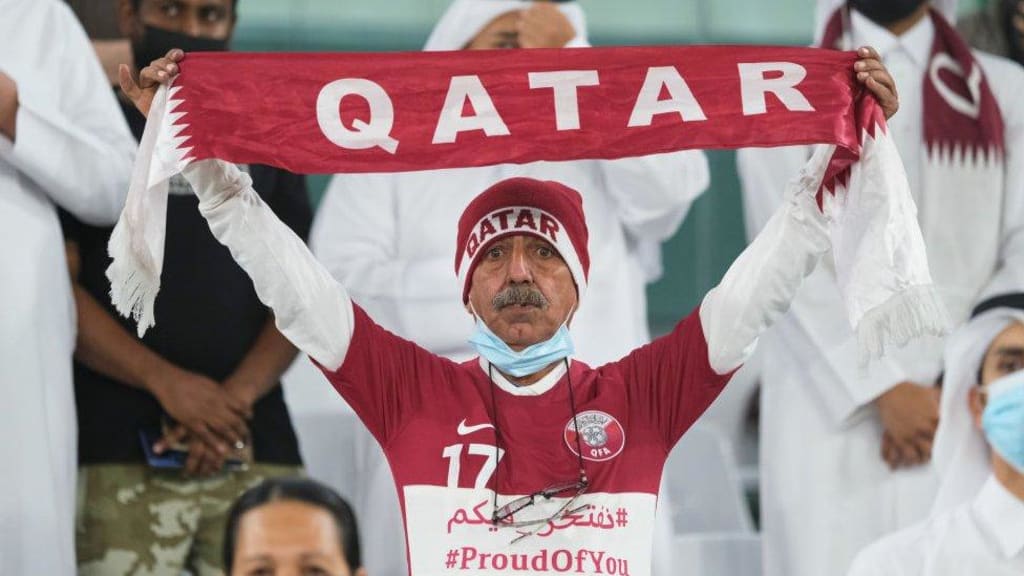Qatar's Controversial World Cup: Why Are People Protesting?
One and a half million football fans from around the globe are anticipated to be visiting Qatar for the FIFA World Cup Finals, which commence on November 20th.

When FIFA announced Qatar as the host of the 2022 World Cup in December 2010, no one outside of Qatar seemed to know where it was lol.
However, Qatar, the Muslim Gulf state, has been receiving increasing complaints about its stance on same-sex relationships.
What is Qatar's stance on the rights of gays and lesbians?
As per Islamic Sharia law, homosexual acts are illegal in Qatar.
Fining, jail time and even death are some of the punishments.
According to Qatar's World Cup organisers, no one will be discriminated against when visiting the country to watch football matches.
Qatar 2022's chief executive, Nasser al Khater, says the government will not change its laws on homosexuality.
In Qatar, any public display of affection between gay or straight couples is frowned upon.
A recent report released by Human Rights Watch says Qatari security forces have continued to imprison gays, lesbians, and transgender people, sometimes forcing them to undergo conversion therapy.
According to Qatar's government, the report contains false allegations. The Emir has pledged that Qatar will not discriminate against anyone for their sexuality. There have been numerous protests about the World Cup being held in Qatar due to human rights abuses, which include arrests of LGBT+ people.
Human rights violations
As the controversy surrounding Qatar's hosting of the 2022 FIFA World Cup continues, protests have sprung up around the globe. The first protest was in Doha itself on 19 November 2013, when a group of about 20 people protested against having the tournament in Qatar and in front of a statue of former Emir Hamad bin Khalifa Al Thani.
The most recent protest occurred on 30 November 2017 and involved fans of the Argentinian national football team. Argentina had played Croatia earlier that day, losing 3-0 and eliminating them from the tournament. A small group of fans who had attended the game gathered to vent their frustrations at Argentina's abysmal performance by banging pots with metal spoons outside Argentina's embassy in Doha. They were later dispersed by police. Police also fired tear gas at protesters near the Corniche waterfront promenade in central Doha.
The conditions of migrant workers
In the lead-up to Qatar 2022, there have been allegations of human rights violations. The Guardian in 2015 reported that migrant workers from Nepal had been tricked into coming to Qatar, promised well-paid jobs only to be given menial tasks for which they were not paid. Migrant workers are also not afforded basic labour rights, such as a weekly day off and being able to change jobs without permission. Nepalese workers themselves live 12-hour days, six or seven days a week. They earn $250 a month – less than half of the monthly living wage in Qatar. Accommodation is often squalid with extreme temperature fluctuations and high humidity. Workers report their passports are confiscated, severely limiting their ability to leave the country if necessary. Indeed these conditions seem horrifically reminiscent of those experienced by Indian slaves on plantations in Trinidad at the beginning of the 20th century, while British colonial officials turned a blind eye. However, one must consider why so many young Nepalese people are so desperate for work abroad that they will accept conditions like these. It’s important to remember what is going on at home in Nepal; poverty levels reached 70% this year, meaning people need money just to survive. These working migrants know what the risk of exploitation means and yet take it because it’s still better than back home.
The cost of the World Cup
The cost of the Qatar World Cup is $200 billion. It is expected to be the most expensive tournament in history. There are many controversies surrounding Qatar winning the bid for hosting, including allegations that there were bribes paid and claims that they may not be able to complete all of their construction by 2022. Critics have also claimed that this could lead to human rights violations. Those critics include people protesting outside FIFA headquarters as well as an international group called FIFA Go Home, who have been protesting every day for three weeks now. These protesters claim that Qatar was selected to host the World Cup due to bribery and because of their close ties with Saudi Arabia, a country which has no diplomatic relations with Israel. They have also criticised some workers’ conditions. Workers building World Cup stadiums in Qatar reportedly live 12-to-a-room, work seven days a week, and must pay employers more than a month's salary just to get their passports back. Other workers build on less than half the minimum wage in countries like Bangladesh, where it costs less to produce goods. In response to these protests, FIFA released a statement saying FIFA will continue its dialogue with Human Rights Watch.
Environmental concerns
The climate in Qatar is already extreme, with temperatures reaching up to 113 degrees Fahrenheit during the summer. This makes it one of the hottest countries on Earth. Not only does this mean that players will have to adjust their training methods and find new ways to stay cool in their uniforms, but there are also environmental concerns over the country's preparations for the World Cup. There is a huge shortage of clean water in Qatar because most supplies come from desalination plants, which consume enormous amounts of energy. With around 4 million visitors coming to the country for just 2 weeks every four years, these facilities would struggle to keep up with demand. And with at least 7 times as many people living in Qatar than normal, the increased strain on resources could lead to shortages not just of drinking water, but also of food and housing. What's more, by 2022 pollution levels could increase by 50%. While the Qatari government has pledged to build wastewater treatment plants and spend $200 billion on renewable energy projects before 2020, some still believe they won't be enough.
Corruption allegations
In the lead-up to Qatar being named the host of the 2022 FIFA World Cup, allegations of corruption were rife. It was alleged that money and bribes were paid to FIFA executives in order to secure Qatar as a venue for the cup. The Qatari bid team denied all allegations at the time and no evidence has ever been found that corroborates these claims. However, as Qatar is an absolute monarchy with no free press or freedom of speech, it is difficult to know what is happening on the ground. According to Human Rights Watch, migrant workers are often mistreated and subject to exploitative labour practices. Several media outlets have also criticised Qatar’s human rights record, accusing authorities of arbitrarily arresting those who criticise the government. These include arrests of journalists and bloggers who dare to speak out against the regime. So when people protest about Qatar hosting the World Cup, they're asking why Qatar should be allowed to ignore its people's human rights, while other countries must comply with certain standards (e.g., respecting women's rights).
That is all
I trust you've had some good times. Remember to follow my page on the off chance that you don't as of now for additional accounts like this, the good times never go out of style.
About the Creator
Mohamed Adesola Adjaou
MSc Digital Marketing Management.
Polygot
I write to heal myself.






Comments
There are no comments for this story
Be the first to respond and start the conversation.